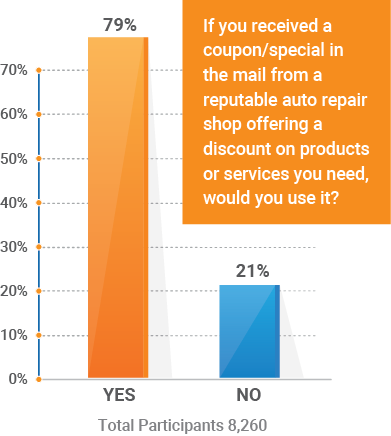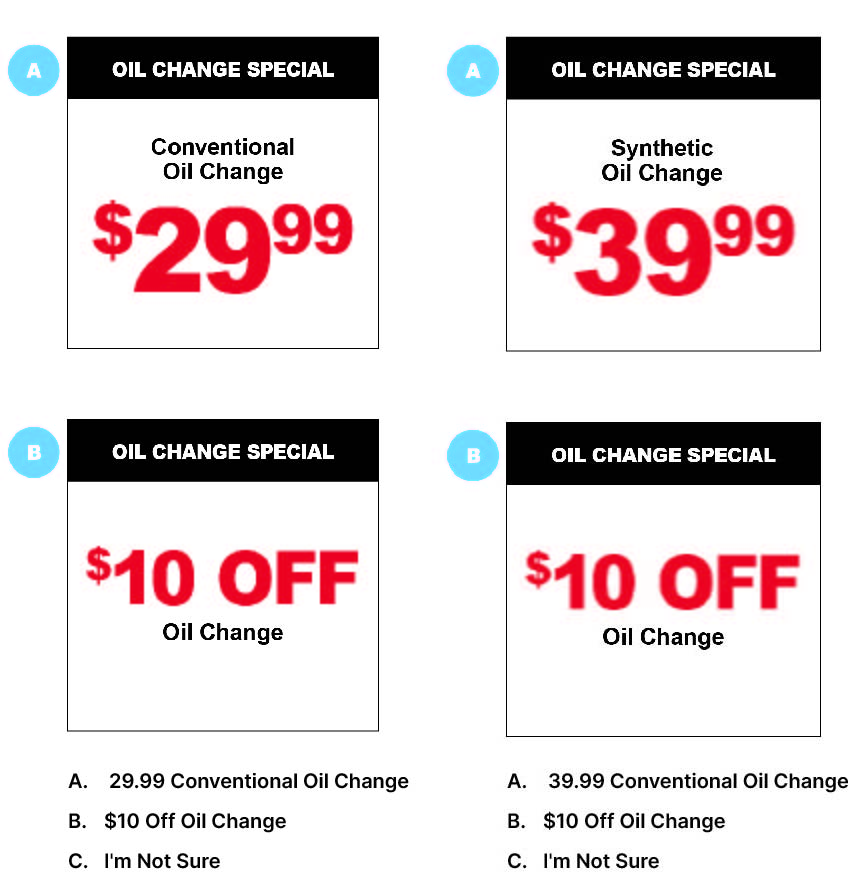Price Point VS $Off
By far, the most utilized and most redeemed auto repair coupon, is the oil change coupon. This brings up the question we get asked most frequently from auto repair shop owners/manager,
“Should I do a price point oil change offer or a $ off oil change offer?”
Before we hop into the addressing this question, I would like to address three key points that I’d bet you’ve either thought of in the past, are thinking now or at some point in time will think, which is:
- I don’t want to be the cheap oil change shop!
- I don’t want to be the coupon shop!
- I don’t’ want the bottom feeders!
Therefore, I would like to address very quickly each of these three points before going any further.
1. I don’t want to be the cheap oil change shop!
We of course understand why you feel this way. However, we STRONGLY encourage you to think about the oil change offer using the adage,
“Today’s Oil Change is Tomorrows Broke Car”
Every single (non-electric) vehicle on the road will need any oil change at some point in time throughout the year. If you can attract a new customer with an oil change service and do a great job, provide them with exemplary customer service and are able to build trust with them, it is highly highly likely that these oil change customers will bring their vehicles back to you for any future service or larger repairs they need.
2. I don’t want to be the coupon shop.
We know and we get it, as we hear this all the time. No shop wants to be a coupon shop. However, a strong coupon for an oil change is often the catalyst for new customers to give your shop a try. As we all know in addition to customer retention, customer acquisition is key to growing your shop.
Furthermore, we know based on our auto repair consumer research found in “Cracking The Code” that the consumer demand for auto repair coupons is huge. To be very specific, we asked 8,260 vehicle owners who have had their vehicle serviced at least once in the past 12 moths, the following question.

“If you received a coupon/special in the mail from a reputable auto repair shop offering a discount on products or services you need,
would you use them?”
A resounding 79% said yes….
With that being said, we know you may be thinking “yeah that’s great but I don’t want to train my customers to use coupons,” AKA I don’t want the bottom feeders.
The solution to this question is found in the response below.
3. I don’t’ want the bottom feeders.
As I have written about many, many times and tell every shop owner that I speak with, if you want to ensure that you aren’t training your customers to only use your service if they have a coupon, there is one simple solution to ensure this.
After you acquire a new customer, simply remove them from all your new customer acquisition marketing and don’t provide them with another coupon.
It is the easiest to do this with direct mail. We simply take our auto repair shops current customers and remove them from their new customer acquisition direct mail campaigns. If these customers do not come back to your shop, they have self-identified themselves as a bottom feeder and have organically removed themselves from your customer base.
Now that we addressed the three points above, let’s discuss the oil change coupon/special question.
“Should I do a price point oil change offer
or a $ off oil change offer?”
There is much debate over this question. We have our own opinion, which we will cover shortly, however, to get some specific consumer insight into this question, we conducted a national consumer research survey.
To get the cleanest data possible, we screened survey respondents with two very specific questions listed below, as well as the reasoning we asked these questions.
Q1: What type of oil does your vehicle use?
**If respondents said they did not, they were automatically removed from the survey.
The Logic: If consumers didn’t know what type of oil their car took, we would not be able to present them with the appropriate sample offer between a conventional or syntenic oil change based on different price points that would somewhat be closer to what an actual real offer would like look like.
Q2: Do you know exactly how much you paid for your last oil change?
**If respondents did remember, they were removed from the survey.
The Logic: If consumers knew exactly how much they last paid for an oil change, then their feedback would be biased based on the price points on our fictious oil change example.
Respondents that made it passed our first two screening questions above, were presented the following survey question.
If you received these coupons in the mail for a conventional oil change – you can only choose one.
Which would you pick?

**As a side note we selected the oil change price points based on what many of our clients have done. We realize that there is a regional competent to this and that this example is not 100% perfect.
Once the above questions were answered, we asked survey respondents one Last question!
Q3: Can you explain why you chose this offer? Please be as specific as possible!
UNFORTUNATELY, After all this work, we were not able to get accurate results and here is why.
After careful review of over 2,000 responses, too many respondents had a point of reference of what an oil change costs and/or what they paid for their last oil change. There clearly skews the results in terms of the offer they chose. Below are just a few examples responses to give you a better understanding.
- That seems cheaper than what I usually pay. I usually pay closer to 60 so $10 off would not be as good of a deal
- Because a typical oil change is almost 50 bucks so that was the better option
However,
- Conventional oil changes here are running over $40 so $29.99 would save more money than $10 off would.
- Because I pay almost $60 for my oil change
- Because I think that’s less than what my car costs for an oil change regularly.
- 39.99 is what I paid for a conventional oil change. My SUV now uses synthetic oil which sometimes costs at least $ 50 or more.
Now, you are probably thinking, why they heck did you waste my time reading this, if there is no clear answer. The reason being, is that although we were not able to get a 100% clear result, we were able to gain some tremendous insight based on reading the 2,000 responses.
Here is what we learned:
Although the numbers are skewed as we mentioned, 68.73% of those presented with the conventional oil change offer, chose the price point coupon and 77.40% of those presented with the synthetic oil change offer, chose the price point coupon. Now again we know this is skewed.
However, the real insight came from reading all the comments and what we uncovered is that the many consumers prefer to know what price they are paying as compared to a $ off.
Here are several example responses below.
- $10 off doesn’t tell me how much I’m actually paying. That’s what I care about in the end. Eg, $10 off $60 is a BAD deal, but $10 off $30 is better
- $10 off doesn’t tell me what the total is. Oil changes are usually around $50-$60 so 29.99 seems like a good deal
- 29.99 is a very good price for an oil change. The other option of $10 off, could actually be higher, because they do not state the price that the $10 could be coming off of. It could be off of $100 which would not be a good deal.
- Because I know the actual prices vs money off what?
- Because I know the exact price
- Because I will know what price it will be
- Because it’s a set price I’d be paying
- I chose the 29.99 oil change because it seems like it would be more economical. The 10.00 of makes me wonder what the original price would be. This way, I know exactly what the price is.
With all the above said, the price point strategy is what we at Mail Shark suggests to our auto repair shop clients. This is supported by results from 100s of auto repair shops that we work with as well as feedback from many of the coaches that we work with.
Many shop owners had switched to a $ off strategy due to the price of oil fluctuating. If your cost of goods is unstable and you feel a $ off strategy is the best way to ensure profitability over the short term, then a $ off strategy is what you should do. The $ off coupons still do work, we just feel that the response is maximized by choosing a price point strategy.
In summation, there is no right or wrong answer, do what you feel is best for your auto repair shop.
If you need help selecting the best coupons/offers for your auto repair shop contact us today. One of our auto repair direct mail marketing experts will help you craft a strategic coupon/offer campaign that will have broad appeal and maximize your response rates.
